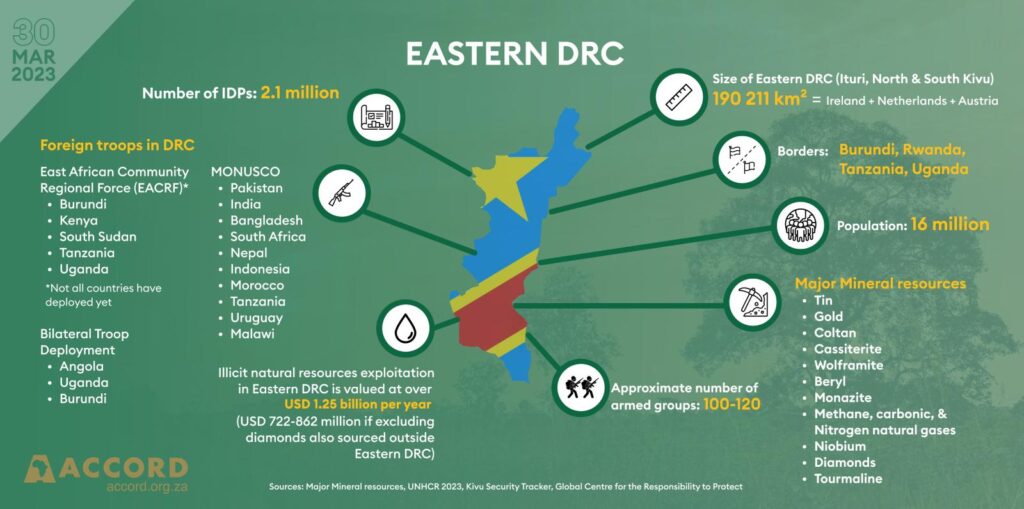Fighting has erupted once again in eastern Democratic Republic of Congo (DRC), casting a shadow over the recent peace deal aimed at resolving the long-standing conflict between the Congolese government in Kinshasa and the M23 rebel group. Despite the optimism surrounding the agreement, clashes have intensified in key regions, raising concerns about the stability of a fragile peace process and the safety of local populations. International observers and humanitarian agencies are closely monitoring the situation, as the resurgence of violence threatens to undermine efforts for reconciliation and recovery in a part of the country that has endured years of turmoil and hardship. This ongoing conflict not only complicates the political landscape but also poses significant challenges for humanitarian assistance in the region.
Escalating Violence in Eastern DRC Challenges Peace Agreement Implementation
The recent outbreak of violence in eastern Democratic Republic of Congo has cast doubt on the feasibility of the peace agreements brokered between the Congolese government and M23 rebel forces. Following weeks of negotiations aimed at stabilizing the volatile region, renewed clashes have erupted in various areas, leading to significant casualties and displacement among local populations. Both sides have accused each other of violating the terms of the ceasefire, further complicating efforts to restore peace. Observers note that the resurgence of fighting underscores the fragile nature of the political landscape and the deep-rooted grievances that continue to fuel unrest.
Stakeholders within the region are raising alarms over the humanitarian implications of such violence, as communities already ravaged by years of conflict face additional hardships. Key factors exacerbating the situation include:
- Resource Competition: Ongoing struggles over mineral-rich areas continue to provoke clashes.
- Militia Activities: Numerous armed groups operate in the shadows, undermining the centralized authority of the state.
- International Involvement: External influences complicate peace-building efforts, with various nations supporting different factions.
Recent reports indicate that thousands of civilians have fled their homes in the wake of intensifying violence, further stressing already limited resources in refugee camps. The international community is closely monitoring the developments, with calls for diplomatic interventions to ensure adherence to the peace agreement. In light of these challenges, the future of stability in eastern DRC hangs in the balance, as the government and M23 representatives struggle to address underlying issues while maintaining ceasefire commitments.
Humanitarian Crisis Deepens as Clashes Continue Amidst Fragile Ceasefire
Fresh outbreaks of violence in eastern Democratic Republic of Congo (DRC) have exacerbated an already dire humanitarian situation. Despite the ink drying on a fragile peace deal brokered between the Congolese government in Kinshasa and the M23 rebel group, clashes erupted in key provinces, further displacing thousands of families. Local sources indicate that civilian casualties are mounting, with many caught in the crossfire as both sides vie for control over strategic territories. Humanitarian agencies are scrambling to respond, but the escalating conflict is hindering access to vital aid and protection for those in need.
The effects of this ongoing conflict are evident in the staggering numbers emerging from the region. An estimated 5 million people are currently displaced, with many lacking access to basic necessities such as food, clean water, and medical care. The recent escalation has led to a surge in emergency humanitarian needs, which could be categorized as follows:
| Need | Current Reach | People Affected |
|---|---|---|
| Food Security | 30% reached | 1.5M |
| Medical Assistance | 25% reached | 1.2M |
| Water and Sanitation | 20% reached | 800K |
Non-governmental organizations are urging for immediate international intervention, stressing that without improved security measures, the situation will deteriorate rapidly. Local communities are rallying for help, but the reality on the ground is marked by increasing violence and desperation, making any progress towards lasting peace seem ever more elusive.
Strategies for Sustainable Peace: Lessons Learned from Ongoing Conflicts in the Region
The recent flare-ups in eastern Democratic Republic of the Congo (DRC) following the peace agreement between Kinshasa and the M23 rebels underscore the complexity of achieving lasting peace in regions ravaged by conflict. Despite diplomatic efforts, the persistence of violence reveals critical lessons in peacebuilding strategies that must be considered to avoid repeated cycles of instability. Among these are:
- Inclusive Dialogue: Engaging all relevant stakeholders, including local communities and marginalized groups, is essential to address the root causes of the conflict effectively.
- Economic Development: Promoting sustainable economic opportunities can mitigate grievances that fuel conflicts and create conditions conducive to peace.
- Strengthening Institutions: Robust governance and the rule of law are paramount to establishing trust and accountability, key components for long-term stability.
Analyzing the ongoing conflicts in the region suggests that short-term agreements without a thorough implementation plan lead to a fragile peace. Lessons from this scenario emphasize the significance of a structured approach that incorporates:
| Strategy | Implementation Challenges | Potential Solutions |
|---|---|---|
| Local Empowerment | Lack of trust in local leaders | Build capacity and promote transparency |
| Monitoring Mechanisms | Insufficient resources for oversight | Engage international partners for support |
| Cultural Sensitivity | Ignorance of local customs | Incorporate traditional leaders in negotiations |
In Retrospect
As tensions continue to escalate in eastern Democratic Republic of the Congo, the recent peace deal between the Kinshasa government and M23 rebels appears increasingly fragile. Reports of renewed fighting highlight the deep-seated challenges in achieving lasting stability in a region long plagued by conflict. International observers and local communities alike watch with concern as the humanitarian situation deteriorates further. The commitment of all parties to uphold the terms of the agreement will be crucial in the coming weeks. With the stakes high for millions of civilians caught in the crossfire, the international community’s role in mediating a sustainable resolution cannot be overstated. As the situation develops, it remains imperative that dialogues foster genuine reconciliation and support from all involved to pave the way for a peaceful future in eastern DRC.
